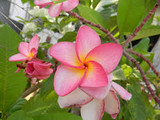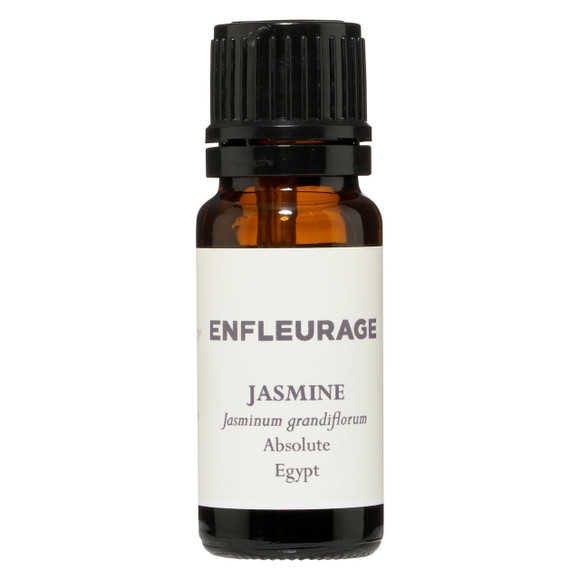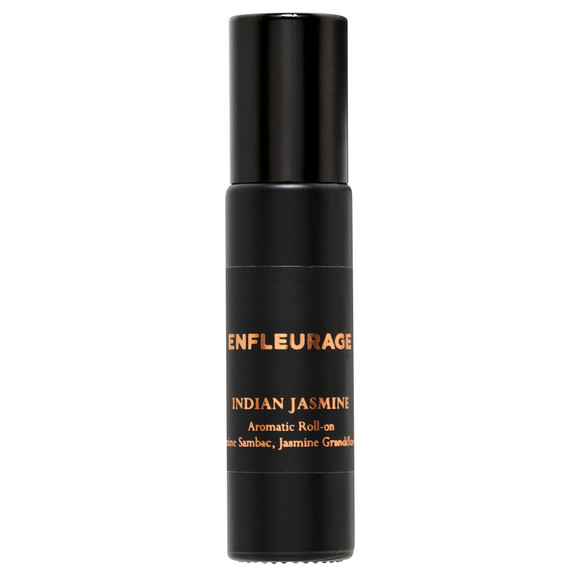Jasmine sambac
Grown and solvent extracted in India! This little fireball is also known as Arabian Jasmine.
This is the wild and wanton jasmine, the firey and exciting one. Picked in the middle of the night and rushed to the extracter while they sing, this is the jasmine you want if the desired action is vigorous in nature.
Jasminium sambac. (Mogra)
Jasminium grandiflorum (Chameli)
Oleaceae Family
Sambac--Extracted from fresh flowers in Tamil Nadu, India via concrète
Grandiflorum--extracted from fresh flowers in Egypt, via concrète
Both of our jasmines, Grandiflorum (native to Iran) and Sambac, (native to India), are solvent extracted; Sambac in Tamil Nadu, Grandiflorum in Egypt.
In India, these two jasmines come from different locations, but are near enough so that the same production facility can extract both….the exact terroirs are slightly different. This is noticeable in the local markets, which sell fresh blossoms, mostly for temples, weddings, and for adornment. Fresh flowers are strung together and one can buy a strand and wear it, usually in the hair.
Grandiflorum flowers bloom first thing in the morning, before the sun comes up, and as sky lightens, and the eventually the sun appears, one can see the fields, full of (usually women) harvesters, and smell the delicate jasmine and even hear, if you listen well, the soft plop of flowers being removed from stalks and going into sacks. Sambac flowers bloom at night and the harvest occurs in darkness, with the blossoms arriving at the facility in the middle of the night.
Both these jasmine absolutes, and also our jasmine enfleurage, which will be a separate listing, are magnificent. They are both jasmine absolute from concrete—but scents are different and the vibe is different—but they are close and from the same Oleaceae family.
The Bloom
white jasmine buds bloom
delicate dainty and fresh~
smell sweet heavenly
--Anitha Jayasankar
haiku jasmine
poet’s jasmine vine
incense of inspiration
spirit in the night
--Susan Ashley
Jasmine
Morning flower pot
Lovely Jasmine is all smiles
I can now walk miles
--Probir Gupta
Arctander says
First I have to preface this by noting that he doesn’t include Jasmine sambac—it’s Jasmine Absolute from Concrete because, we know Perfume and Flavor Materials of Natural Origin was published in 1960, and the planet was very different and humans, technology, society, etc, vastly different. Some aromatics existed then and here in the modern world we have never smelled them and the reverse is also true. The center for perfume materials were in Western Europe, specifically France. India was not such a major producer as it is now, and even though Sambac has been produced in India for hundreds if not thousands of years, it was apparently not as popular in the west—the Indian production was domestic. And Arctander does not include it, shocking as we may find that now….I’m not sure why it’s not included.
Jasmine absolute from concrete is a dark orange (on ageing reddish brown), somewhat viscous liquid and it possesses an intensely floral, warm, rich and highly diffusive odor with a peculiar waxy-herbaceaous, oily-fruity and tea-like undertone.
Jasmine absolute represents one of the most striking examples of nature’s ability to round off and conceal-or unsurpassably utilize-the odor-effect of very simple odorants, e.g. benzyl acetate and linalool, the main constituents of jasmine absolute….Most perfumers have, at one time or another in their experience, tried to duplicate the fragrance of jasmine using the chemical constituent literature, which he also calls as a very unartistic approach to a perfume problem—totally agree. He goes on to shred these attempts at recreation, which you can read about in his book. He also gets down to the crux of it, where we admit that the scent of jasmine lies in the “minor” constituents. We all know most synthetic jasmine is never any more than a sad little echo of the full magnificent flower.
Arctander then goes on further say the following can be incorporated into artificial jasmine bases and lend “striking true-to-nature effects”. Deep herbaceous tea-like notes from tealeaf or mate extracts, waxy, honey-like sweetness form beeswax extract, grassy fattiness from perilla (shiso) or gingergrass oil, warm tobacco-like and herbaceous from chamomile oil etc.
He says that jasmine is used in so many perfumes and in so many ways that we can’t establish a rule for its use and that the old saying “No perfume without jasmine” is pretty absolute (pun mine). Jasmine and rose together create the foundation of numerous “grands perfumes” as well as the majority of ordinary perfumes—where a floral note will be from a jasmine in 9 out of 10 cases. So little of it needs to be present to obtain enough of a floral note that “even true jasmine absolute is rarely too expensive to use.”
Battaglia says
Aromatherapy uses include
Antidepressant
Antispasmodic
Aphrodisiac
He says (and I agree) the therapeutic value of jasmine is inseparable from its delicious exquisite aroma.
Nervous anxiety
Restlessness
Fear
Depression
Safety Warning
As with most essential oils, dilute before using on skin. Perform a patch test before use if essential oil sensitivity is suspected. Do not take essential oils internally. Do not use on children or pets. Seek advice from a trained aromatherapist before using on people with compromised immune systems. Keep away from eyes and mucus membranes.
Enfleurage makes no medical claims relating to any products, essential oils or otherwise, on our website or through social media. We are an essential oil company, not doctors, The FDA has not evaluated the statements on this website. We present our information in order to educate our customers on traditional and general uses of essential oils; in no way do we diagnose, cure, treat, or prevent any disease or condition.
You the customer are responsible for understanding the safe use of any and all of our products, including essential oils, and use them accordingly.















